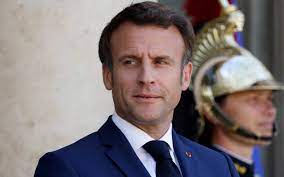Anne-Elisabeth Moutet
It’s the rumour that’s been doing the rounds in Paris for almost three months. Emmanuel Macron has been finding the lack of a majority in the National Assembly frustrating: it’s a climbdown from his first term, when the party of the self-minted “Jupiter” enjoyed a 35-seat majority. The president is said to be toying with the idea of calling an early presidential election.
It’s not that Macron believes he could win easily: this has become increasingly unlikely given the response to his botched pensions reform. The idea is that, like General de Gaulle in 1969, he would prefer to resign grandly rather than endure a “cohabitation” with an opposition prime minister, as François Mitterrand did in 1986-88 with Jacques Chirac, and Chirac himself had to between 1997 and 2002 with the Socialist Lionel Jospin.
According to the theory, Macron would walk away, leaving a successor (probably Marine Le Pen) to deal with a country polarised, overtaxed, smothered in debt, its infrastructure, school system and health service threadbare, incapable of slowing down unwanted immigration or to assimilate her newest citizens as her German neighbour does. Untouched by self-doubt, the president believes no one can do better than him in the next five years: aged only 50, he could then run again in 2028, his absence cancelling the constitutional limit of two consecutive terms.
Needless to say, the rumour has been denied: for one thing, the optimistic interpretation of constitutional law it rests on would need to be validated by France’s Conseil constitutionnel. For another, it assumes the country would be clamouring for more Macron after a Le Pen term. Some accounts say the president is sure of success; others point out that should a president Le Pen not do well, he would be chiefly remembered as the man who gave her the keys to the Élysée; and should she actually pull a Giorgia Meloni, she would in all likelihood be re-elected.
But against these dire readings of the runes is Macron’s existential ennui. From many accounts, he is no longer interested in domestic affairs. Last year, as he was running again, his dream was to make his mark on international affairs. Hence his visits to Vladimir Putin, and his grandiose plans for Europe, which he first laid out in a Fidel Castro-length speech at the Sorbonne in September 2017.
It set out three directions for the EU: namely establishing European economic, political and military sovereignty – in which he saw France as the prime mover. His dreams ranged large: various Élysée courtiers mentioned his hope of a Nobel Peace Prize; at other times there seemed to be an interest in the presidency of the EU; as for Europe’s military independence, Macron declared Nato brain dead.
As it turns out, Macron’s plan to create, top-down, “European tech unicorns” with fat, bureaucrat-adjudicated subsidies died in the same way as the still non-existent French Covid vaccine; EU political unity has been revived by the war in Ukraine, where leadership has come from northern, central and eastern Europe, not France; and Nato woke up from its alleged coma as the one defence body capable of punching its weight in a real war situation.
The question remains whether the Dreamer of the Élysée still wants to throw the electoral dice. His poll numbers are bad. Never elected to any other office in his life, he doesn’t have the parliamentary clout to force useful alliances. His choices are now a three-and-a-half-year lame-duck long goodbye, or a flamboyant game of Russian roulette. He probably has the stomach for neither.
The Telegraph







